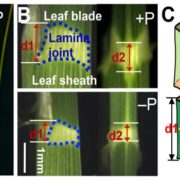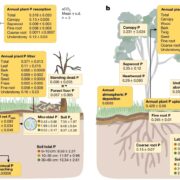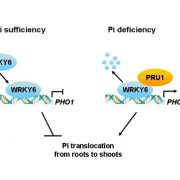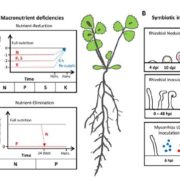Effect of plant-derived versus animal-derived fertilizers on the rhizosphere microbiome
 Yu et al. conducted a meta-analysis of published 16S rRNA gene amplicon sequenced soil samples to compare the effects of plant-based fertilizers (e.g. compost, seaweed fertilizer) versus animal-based fertilizers (e.g., dung, manure) versus control, unfertilized samples on soil microbial diversity and function. Their analysis showed that the fertilizer source significantly influences microbial functional profiles and the metabolic pathways and biogeochemical cycle processes that are upregulated. The authors validated these findings experimentally by investigating the effect of the four fertilizer sources (fermented pig or chicken manure, fermented tree leaves or tea slag) on pakchoi (Brassica chinensis L.) All fertilizers showed a significant increase in plant growth versus unfertilized treatment and confirmed the findings of their meta-analysis on the impact of soil microbial function. Both types of fertilizers increased the stability of rhizosphere microbial communities, but in different ways. The animal-derived fertilizer mainly enriched genes related to nitrogen cycling while the plant-derived fertilizer enriched genes related to carbon fixation, carbon degradation, and methane metabolism. However, in samples treated with animal-derived fertilizers there was an increased abundance of antibiotic resistance genes and viruses related to human disease. Given the risks to human health conferred by animal-derived fertilizer samples, the authors conclude that plant-derived fertilizers are safer for sustainable crop production. (Summary by Abdulkabir Omeiza Abdulmalik @Omeiza_PlantDoc) Appl. Environ. Microbiol. 10.1128/aem.01719-23
Yu et al. conducted a meta-analysis of published 16S rRNA gene amplicon sequenced soil samples to compare the effects of plant-based fertilizers (e.g. compost, seaweed fertilizer) versus animal-based fertilizers (e.g., dung, manure) versus control, unfertilized samples on soil microbial diversity and function. Their analysis showed that the fertilizer source significantly influences microbial functional profiles and the metabolic pathways and biogeochemical cycle processes that are upregulated. The authors validated these findings experimentally by investigating the effect of the four fertilizer sources (fermented pig or chicken manure, fermented tree leaves or tea slag) on pakchoi (Brassica chinensis L.) All fertilizers showed a significant increase in plant growth versus unfertilized treatment and confirmed the findings of their meta-analysis on the impact of soil microbial function. Both types of fertilizers increased the stability of rhizosphere microbial communities, but in different ways. The animal-derived fertilizer mainly enriched genes related to nitrogen cycling while the plant-derived fertilizer enriched genes related to carbon fixation, carbon degradation, and methane metabolism. However, in samples treated with animal-derived fertilizers there was an increased abundance of antibiotic resistance genes and viruses related to human disease. Given the risks to human health conferred by animal-derived fertilizer samples, the authors conclude that plant-derived fertilizers are safer for sustainable crop production. (Summary by Abdulkabir Omeiza Abdulmalik @Omeiza_PlantDoc) Appl. Environ. Microbiol. 10.1128/aem.01719-23









